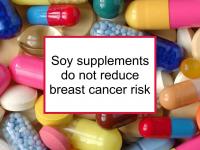The soy isoflavones genistein and daidzein are compounds with estrogenic properties (phytoestrogens) with a variety of effects in human cells. They have been proposed as relatively safe treatments for menopausal symptoms. Some studies have suggested they could also reduce breast cancer risk.
Now a new study has reported that soy isoflavone supplements do not reduce breast cancer risk markers in a group of healthy, but high risk women. In addition, such supplements might increase breast cancer risk among premenopausal women.
Latest research finds soy isoflavones do not reduce BC risk
The new study referenced at the beginning of this news article was designed to investigate whether soy isoflavone supplements could protect against breast cancer in healthy, but high risk, women. To examine this question, the authors conducted a double-blind trial of soy isoflavone supplementation and measured its effects on breast cell proliferation and other breast cancer markers. The study included 98 women considered at high risk for developing breast cancer who were randomly assigned to receive either a soy isoflavone supplement or a placebo for six months.
Breast cancer cells retrieved before and after treatment were tested for proliferation and other signs of abnormality. The expression of 28 genes involved in proliferation, apoptosis, and estrogenic effect were also measured. In addition, hormone and protein levels were measured in nipple aspirate fluid.
The proliferation index (Ki-67) was not reduced by isoflavone treatment. In fact, the Ki-67 index increased for premenopausal women treated with isoflavones. In addition, there were significant increases in the expression of 14 of the 28 genes examined in the isoflavone group, but not the control group. No treatment effects were found for the other parameters measured.
The authors concluded that six months of treatment with soy isoflavones did not reduce breast cell proliferation in healthy, high-risk women, suggesting a lack of efficacy for breast cancer prevention. The authors also observed a possible adverse effect in premenopausal women. In a separate interview, lead researcher Seema A. Khan stated, “Simply put, supplements are not food. Although soy-based foods appear to have a protective effect, we are not seeing the same effect with supplementation using isolated components of soy.”
